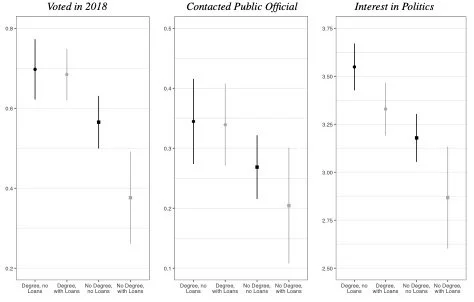Public Opinion and Policymaking
Bad Lessons: Policy Feedback and the Democratic Costs of Student Loan Debt (2024), with Erin O'Brien
Student loan debt is at record levels in the United States. The negative psychological and financial effects for borrowers are well-documented. This article turns to the individual-level political effects of student loan debt. Rooted in the policy feedback literature, we examine whether the rise in student loan debt is associated with negative feedback effects for democratic engagement, and how this affects participatory inequality. We find that individuals who took on debt but did not obtain an associate's or bachelor's degree ("stop-out") are less interested in politics and heard less by their government. Policy design in American higher education inculcates bad lessons for democracy.
Framing Effects and Group Differences in Public Opinion about Prison Pell Grants (2021), with Kevin Wozniak
After years of gridlock on the issue, a bipartisan group of members of Congress struck a deal in 2020 to restore eligibility for inmates to access Pell Grants. Evidence indicates that college education programs in prison reduce recidivism and, consequently, state corrections expenditures, but legislators in prior decades feared that voters would resent government subsidy of college classes for criminals. To assess the contemporary politics of the issue, we analyze data from a framing experiment embedded in the 2016 Cooperative Congressional Election Study. We find that Americans, on average, neither support nor oppose the proposal to restore inmates’ Pell Grant eligibility; however, exposure to arguments about the proposal’s benefits to inmates in particular and American society more broadly both increased subjects’ support. We further explore how this framing effect varies across political partisanship and racial resentment. We find that both frames elicited a positive response from subjects, especially among Democrats and subjects with low or moderate racial resentment.
Public Opinion and the Politics of Collateral Consequence Policies (2020), with Kevin Wozniak
We analyze data from a national sample of the U.S. population to assess public support for policies that deny former offenders’ access to job training programs, food stamps, and public housing. We find that Americans generally oppose benefit restrictions, though support for these policies is higher among Republicans and people with higher levels of racial resentment. We also find that a legislator’s criminal justice reform positions generally do not significantly affect voters’ evaluation of him or her, and even voters with more punitive attitudes toward collateral consequence policies support legislators who advance particular kinds of reform proposals. These findings provide little evidence that any group of Americans would be mobilized to vote against a legislator who works to reform collateral consequence policies. We discuss the implications of these findings for American and comparative studies of the politics of punishment.
Presidential Confidence in Crisis: Blame, Media, and the BP Oil Spill (2015), with Stephen Goggin
Recent studies find that voters regularly punish presidents for seemingly unrelated events, despite a clear understanding of how these issues become tied to the president. We contend that the media plays an important role in creating this link. Testing this, we examined how the 2010 BP oil spill shaped evaluations of President Obama, paying particular attention to news coverage to isolate the event's applicability to the president. We estimate the causal effect of these different frames by matching respondents from a pre-spill control group to two separate treatment phases, finding that presidential confidence decreases once the media begins attributing political blame.
Education Reform after NCLB: Popular Support and Partisan Divisions.
Despite significant bipartisan support at the time of passage, No Child Left Behind (NCLB) has failed to meet the expectations of parents, school officials, and politicians alike. The prescriptions for reform, however, are anything but bipartisan. Since NCLB was signed into law, elite opinion on education policy has grown more divisive on issues ranging from student testing to school choice. But, have voters polarized as well? I examine this question using an experimental design that studies how subjects evaluate Democratic, Republican, and Bipartisan policy provisions. Using text from amendments to the Student Success Act (H.R. 5), the study tests how constituents respond to different proposals currently being debated in Congress. In the end, I find that voters do not exhibit the same partisan tendencies as officeholders. Indeed, the results suggest that there is widespread support for Bipartisan and Democratic issues, irrespective of the subject's party identification.




